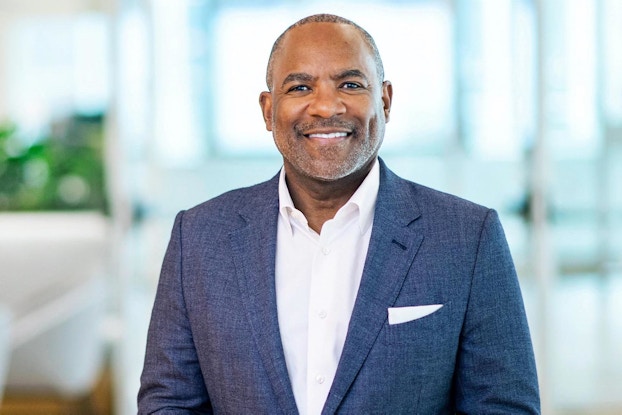
How to be a great mentor, according to Colbert Narcisse, Chief Product Officer of retirement giant TIAA:
- Listen more and talk less.
- Provide feedback and not judgment.
- Encourage folks to be the best version of themselves.
Colbert Narcisse is Chief Product and Business Development Officer at TIAA, a Fortune 100 insurance company that specializes in retirement issues for people in academic, government, medical, cultural, and other nonprofit fields. He is responsible for managing TIAA’s core retirement products, which are primarily in-plan annuities.
Through the years, Narcisse has worked with some of the biggest and most familiar financial brands, including Merrill Lynch, where he held senior management roles in investment banking and wealth management, and at Morgan Stanley, where he served as managing director and head of international wealth management.
His mentors, including senior financial services executives and his high school guidance counselor, who guaranteed a loan for Narcisse’s first year at Harvard Business School, helped make him the leader he is today.
Narcisse explains to CO— how and why these three mentors, who continue to have regular contact with him, played central roles in his personal evolution into one of the most senior executives at a company that manages more than $1 trillion in combined assets from five million active and retired employees.
CO —: Who is your mentor and why?
CN: I have several mentors. One is my high-school guidance counselor, Ernie Rudloff, who I have known for 40 years. We met [when I was in] in ninth grade [and] he was assigned as my guidance counselor at Bishop Loughlin Memorial High School in Brooklyn, NY.
Another was Jeffrey Humber, who was managing director at Merrill Lynch and one of the first African Americans to graduate from Harvard Business School. He is now SVP and group manager at PNC.
Finally, there’s Gregory Fleming, who I met at Merrill Lynch and left for Morgan Stanley, and later asked me to join him there. He is now the founding CEO of Rockefeller Capital Management.
CO —: What were your mentors like?
CN: Ernie Rudloff was a very energetic and engaging character. The connection I had with him in ninth grade was the very first I’d ever had with a teacher or counselor. We shared a love of baseball and that connected us. I learned a lot from him about myself.
I met Jeff Humber when I interviewed for a summer role at [Merrill Lynch] and he was part of the panel who interviewed me. After the internship, he extended an offer to me to join the firm.
I met Greg Fleming at Merrill Lynch. Greg was running the group that I wanted to move into. It required a huge leap of faith from him that I’d be able to make the adjustment from one area of the company to another. He was willing to give me a shot believing that I would be able to do the work and to learn the job. I became managing director in just three years working under him. He eventually left to join Morgan Stanley and I joined him there a couple of years later.
[Read: Top DEI Execs from Carter’s, Thumbtack, and Fossil on Diversity Strategies That Drive Real Results]
CO—: What have you learned from them that’s key to your career?
CN: If you put in the hard work, you can accomplish what you want, is what I learned from Ernie.
Understanding how to develop client relationships and make them more than transactional is what I learned from Jeff. When he was asked to take on a different role as a country head of South Africa, someone had to take over the accounts he’d nurtured. There were a lot of folks who wanted to take them over, but he was adamant that I’d earned it because I had worked with those clients. They liked me, knew me, and were comfortable with me. He felt like I could continue to do business with them.
Greg showed me how to move from one area of expertise to another. He showed me how to establish myself by taking an unorthodox path to becoming a third-year vice president—because of his guidance and coaching, it took me three years instead of four or five. He gave me the right assignments and levels of responsibility.
They all taught me that mentors will not necessarily look like you. They might be female. They might be Hispanic. They can be any color. If you presume they have to look like you, you will be mistaken.
Colbert Narcisse, Chief Product and Business Development Officer, TIAA
CO—: Show us your mentors’ imprint in action.
CN: Ernie co-signed for a sizable student loan for my first year of business school. That was the ultimate sign of support. It gave me the encouragement I needed to make something of myself. My commitment to him was to pay that loan off in one year, not ten.
Jeff taught me how to nurture client relationships and make them more than transactional.
When I joined Morgan Stanley, I was asked to learn a new business that was going through upheaval and to develop a long-term business strategy. Greg had taught me how to understand the key drivers in each industry. It was a leap of faith, but he knew I could do it even though I’d never done it before.
They all taught me that mentors will not necessarily look like you. They [can] come from different socioeconomic backgrounds. They [can] have skills in different areas. They might be female. They might be Hispanic. They can be any color. If you presume they have to look like you, you will be mistaken.
[Read: Execs From Hershey’s to Microsoft Reveal Their Mentors’ Best Advice]
CO—: How does your work at TIAA reflect your mentors’ imprint?
CN: My current job at TIAA is the combination of all these things I’ve learned from each of these folks. Ernie taught me to have confidence in myself and communicate and engage with people on a number of different subjects. [For example,] I can talk with (former New Jersey Governor) Chris Christie about the Mets. Who [would have] thought that a kid born in Haiti who grew up in Brooklyn would be speaking to a room of 500 people as I do now at TIAA? I also can find myself on CNBC talking about markets. Being able to communicate [to diverse audiences] has been very big for me.
Jeff taught me how to build relationships internally and externally. And Greg taught me how to move from one area of the business to another. It was a huge leap of faith that I’d be able to make that adjustment.
CO—: Complete this sentence: If not for my mentor, I would likely have never…
CN: Had I not met all three mentors, I would not have realized my full potential.
Had I not met them, I would not be a well-rounded individual.
Had I not met them, I don’t think I would have appreciated why it’s necessary to give back to causes that are important to you.
Why is it important to have a mentor?
CN: Third-party affirmation and support are critical.
- You are more likely to accept feedback from someone who is not your parent.
- If you have a mentor, you are more likely to pay it forward and be a mentor.
CO— aims to bring you inspiration from leading respected experts. However, before making any business decision, you should consult a professional who can advise you based on your individual situation.
CO—is committed to helping you start, run and grow your small business. Learn more about the benefits of small business membership in the U.S. Chamber of Commerce, here.
CO— Exclusives: Insider Strategies
How the buzziest brands and hottest startups are solving today's biggest business challenges. CO— brings you advice from startup founders and top executives for thriving in a new world.








